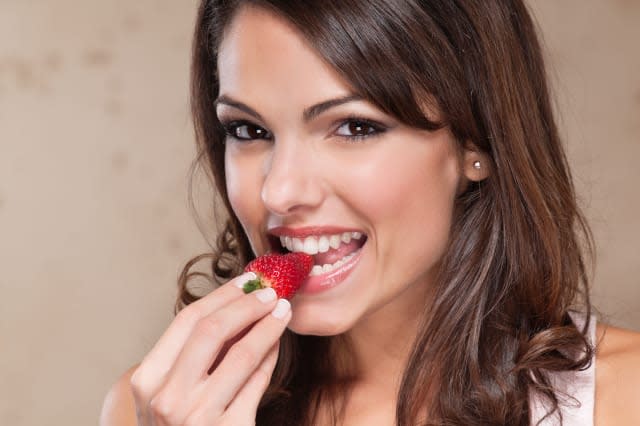Six foods that naturally whiten teeth - and what to avoid

You know that eating too much sugar rots your teeth – but do you know the best foods to eat to keep your teeth healthy? Or which foods will naturally whiten your gnashers? Here are the foods you should eat – and what to avoid if you white a bright smile.
See also: Five best electric toothbrushes
See also: Beauty-boosting super foods you can eat AND put on your face
1. Raw fruit and veg
Eating hard fruit and veggies - such as carrots and celery or apples and pears - increases saliva production, helping to see off bacteria that can lead to bad breath and plaque. As well as acting as a natural toothbrush, eating 'crunchy' fruit and veg helps to strengthen the gums too. Raw cauliflower is one of the best foods for breaking down stains.
2. Cheese and yoghurt
Rich in calcium that keeps teeth strong, milk, yoghurt and cheese are must-haves if you want a whiter smile. Like raw cauliflower, cheese and yogurt cause your mouth to produce excess saliva, which helps to break down stains on enamel. However, cheese has additional whitening effects as it contains lactic acid, which helps to dissolve superficial stains on the surface of your teeth. Cheese has also been shown to boost the pH level in your mouth, thereby strengthening the enamel.
3. Strawberries
Don't be fooled by its surface colour - the malic acid within strawberries is a natural astringent and can help to remove surface discolouration. You can even smash up the summer fruit and mix it with baking soda to form a whitening paste to brush on your teeth. If you decide to try it, brush with your normal toothpaste immediately following to help remove any residual malic acid. Other fruits that contain malic acid include apples, nectarines, cherries, peaches and bananas.
4. Sunflower seeds
Sunflower seeds act as an exfoliant for your teeth, removing stains and whitening the surface of teeth. Other seeds and nuts, such as almonds, walnuts, and cashews, have a similar effect.
5. Pineapple
If you want to whiten your teeth, pineapple is a good choice. The fruit contains the enzyme bromelain, which disrupt the proteins on the surface of enamel, breaking up stains and discoloration, which is then naturally washed away by saliva.
6. Drink water
We often indulge in foods and drinks that discolour our teeth, but keeping a glass of wonderful water close at hand will help to keep the staining at bay. Dark-coloured foods and drinks, such as spinach, beetroot and blueberries, wine, tea and coffee all take their toll on our tooth colour, but you can help by rinsing out your mouth with water after eating them. Just be sure to drink still water, as sparkling water can also erode tooth enamel.
What to avoid
Sugar and acid are your teeth's worst enemies. It can take 30 minutes to two hours for the mouth to recover from enamel-harming acid. So if you're eating or drinking acidic or sugary things more than every 30 minutes, there's no chance for the mouth to recover. Foods that stick to the surface of your teeth are also particularly bad – so avoid chewy sweets and limit how often you eat dried fruit.
Coffee and tea, along with carbonated drinks, changes the pH balance of your mouth and can damage the surface of the enamel. Cola is best avoided, as its high sugar content and carbonation can erode the enamel of the teeth. If you can't give up fizzy drinks, drink it through a straw to limit the damage.
Dark-coloured foods and drink, such as red wine, balsamic vinegar and soya sauce can all darken the teeth. Tomato-based pasta sauces, which have naturally high acidity levels, can also leave your teeth vulnerable to staining due to their bright red colour.



